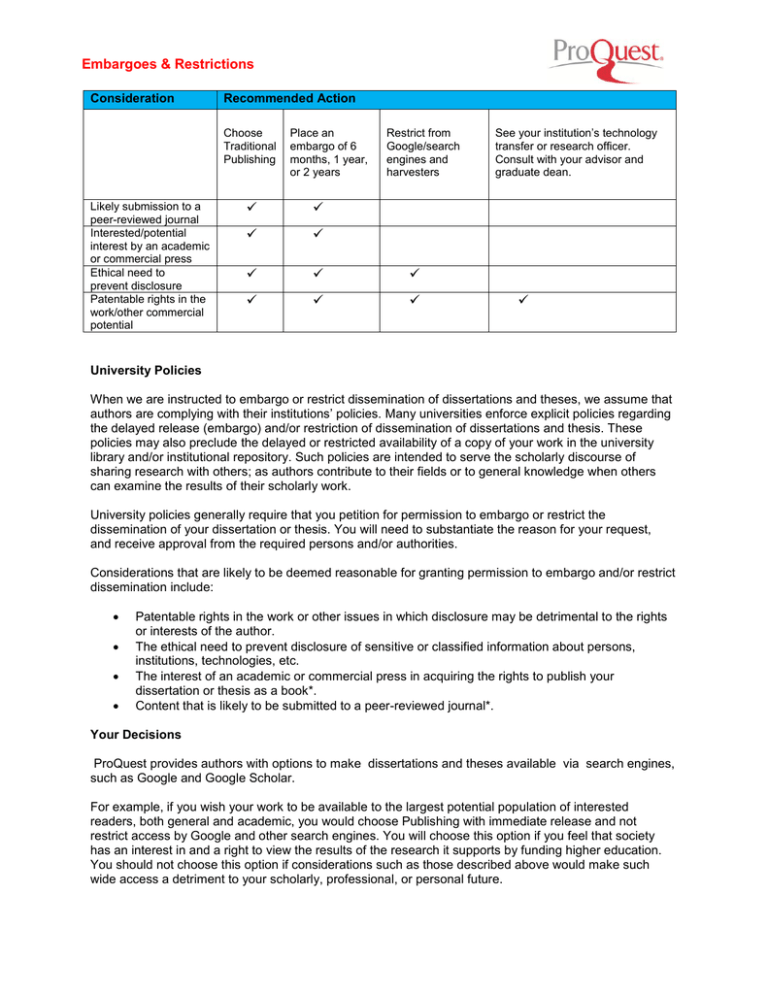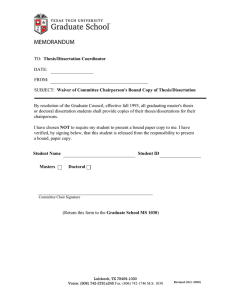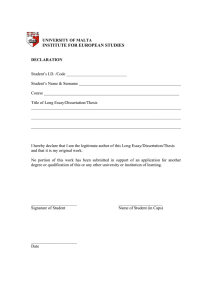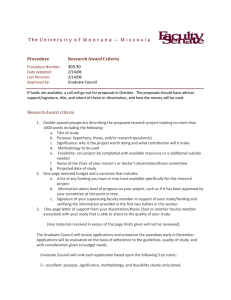Embargoes & Restrictions Consideration Recommended Action
advertisement

Embargoes & Restrictions Consideration Recommended Action Choose Traditional Publishing Likely submission to a peer-reviewed journal Interested/potential interest by an academic or commercial press Ethical need to prevent disclosure Patentable rights in the work/other commercial potential Place an embargo of 6 months, 1 year, or 2 years Restrict from Google/search engines and harvesters See your institution’s technology transfer or research officer. Consult with your advisor and graduate dean. University Policies When we are instructed to embargo or restrict dissemination of dissertations and theses, we assume that authors are complying with their institutions’ policies. Many universities enforce explicit policies regarding the delayed release (embargo) and/or restriction of dissemination of dissertations and thesis. These policies may also preclude the delayed or restricted availability of a copy of your work in the university library and/or institutional repository. Such policies are intended to serve the scholarly discourse of sharing research with others; as authors contribute to their fields or to general knowledge when others can examine the results of their scholarly work. University policies generally require that you petition for permission to embargo or restrict the dissemination of your dissertation or thesis. You will need to substantiate the reason for your request, and receive approval from the required persons and/or authorities. Considerations that are likely to be deemed reasonable for granting permission to embargo and/or restrict dissemination include: Patentable rights in the work or other issues in which disclosure may be detrimental to the rights or interests of the author. The ethical need to prevent disclosure of sensitive or classified information about persons, institutions, technologies, etc. The interest of an academic or commercial press in acquiring the rights to publish your dissertation or thesis as a book*. Content that is likely to be submitted to a peer-reviewed journal*. Your Decisions ProQuest provides authors with options to make dissertations and theses available via search engines, such as Google and Google Scholar. For example, if you wish your work to be available to the largest potential population of interested readers, both general and academic, you would choose Publishing with immediate release and not restrict access by Google and other search engines. You will choose this option if you feel that society has an interest in and a right to view the results of the research it supports by funding higher education. You should not choose this option if considerations such as those described above would make such wide access a detriment to your scholarly, professional, or personal future. Internet search engines are a key tool for all of academia, and we believe graduate works should be easy for researchers to find. Therefore, if you need to limit dissemination of your work, you will need to exclude it from internet search engines. We provide you the ability to limit search engine exposure through the ETD Administrator. Please note, however, that internet search engines are likely to find your dissertation or thesis through other access points, especially through the library or institutional repository at your graduate institution. If you truly need exclusion from search engines to access your work in an IR, you will need to petition for restriction at your graduate institution. *Publishing with ProQuest Dissertation Publishing: Effects on publishing your content elsewhere The first thing to remember is that you own your copyright. Unlike most scholarly publishers of journals and monographs, ProQuest does not acquire copyright when we publish your dissertation or thesis. You are free to re-publish your work in whole or in part, with whomever you choose without asking for our permission. Some authors are concerned that journals and other publishers will not accept content that has been published in or as a dissertation or thesis. This concern is less valid in the case of peerreviewed journals, and potentially more valid in the case of commercial book publishers. While every case is unique, here are some general rules of thumb for examining this issue with regard to your own work: In most cases, you will not be submitting your dissertation or thesis as is to a peer-reviewed journal (unless it is a journal that publishes a monograph series). Most often, the content submitted for journal publication is an excerpt, chapter, or section of your dissertation or thesis. At the very least, it would be a significantly shorter distillation of your graduate work. The content is likely to be rearranged and reformatted to fit the style of the journal to which you submit. Finally, the content is likely to be revised and updated through the peer-review process and then the editorial process if it is accepted. All of these processes mean that the material, as finally published by a journal, is substantively and substantially refined and therefore different from the content that is published as your dissertation or thesis. For this reason, journals are not historically concerned about your content having appeared and been distributed as a published graduate work. This is particularly true in the STEM disciplines (science, technology, engineering, etc.). Academic presses, monograph publishers, and commercial presses are more likely to consider your dissertation or thesis as a book. This is more often the case with the humanities, social sciences, and arts. Still, even if not peer-reviewed, the editorial process that turns your graduate work into a book is likely to change it substantially. The key in this consideration is whether the content changes substantively; i.e., is there a real difference in the content that makes the press comfortable with investing its resources in producing a book from your dissertation/thesis. Historically, presses have not been terribly concerned that distribution of your graduate work would harm potential sales as a book. However, as dissertations and theses have become widely available over the internet through libraries, consortia and institutional repositories as well as from our subscription database, more presses may look more carefully at the question of marketability. 6/5/2013 In developing your dissemination strategy, you should seek the advice of well-established mentors in your field if you feel that your future ability to publish dissertation/thesis content might be jeopardized by wide dissemination. If you decide that it might, you may want to take one or more of the precautions shown in the table above. Post-Graduation Publishing Prior to graduation, embargoes are subject to university policies. However, when authors are presented with post-graduation publishing opportunities, some publishers request or require the author to adjust the availability of the full-text of their graduate work. As a non-exclusive publisher, ProQuest recognizes authors’ rights as copyright holders, and as such, the author’s discretion regarding the dissemination of their work. ProQuest will forward notification of author-requested changes related to ProQuest full text availability to the university. (For those schools using the “ProQuest ETD Administrator,” an email message will be sent to the primary administrator.) We also recommend that authors contact their institution to notify them of their retrospective embargo requests, as policies and approaches of institutions differ. Please keep in mind that this only affects the work as it appears in ProQuest. The rules and policies around dissemination related to a university’s institutional repositories are created and managed separately by the university. In addition, please note that until a student has graduated, all changes in availability regarding the full text must come from the university. Outside of the United States, these guidelines are subject to legal jurisdictions of the country of origin.


